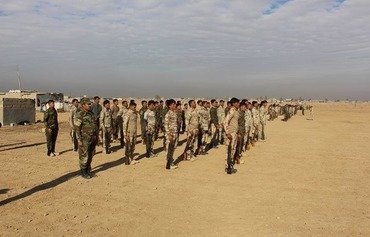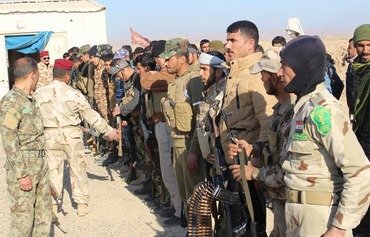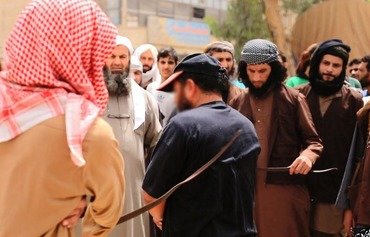Hundreds of families are risking everything to flee hunger and the brutality of "Islamic State of Iraq and the Levant" (ISIL) rule in the city of al-Hawija in Kirkuk province.
On October 2nd, Iraqi security forces welcomed more than 500 civilians, mainly women and children, in the Kirkuk city suburb area of Maktab Khalid, officials told Diyaruna.
"This is the latest exodus of families from al-Hawija and surrounding areas, which have been under ISIL control for more than two years," said Ammar Sabah, head of Kirkuk's Migration and Displacement department.
Most of those fleeing are heading towards Maktab Khalid as well as to the cities of Daquq and al-Dibis, where they are being received by security forces and provided with urgent assistance, he told Diyaruna.
"As soon as they arrive, we provide them with food and drink and emergency care for the wounded and sick, before moving them to camps for internally displaced people (IDPs) in Kirkuk province," he said.
Then they are entered into a database to receive financial assistance, supplies and humanitarian aid, Sabah added.
"We have enough food stocks and relief supplies for 5,000 families and are fully prepared to deal with any emergency situation," he said.
'Escape was the only option'
Abu Abdullah, 59, was one of hundreds of civilians who fled al-Hawija towards Maktab Khalid on October 2nd.
They endured "an arduous and perilous journey", said Abu Abdallah, who asked to use a pseudonym for safety reasons.
Still, "families chose to escape and risk their lives instead of staying in the city and starving to death", he told Diyaruna. "We have nothing left to eat. Food such as wheat and rice are either unavailable or too expensive."
Abu Abdallah said the price of a 50-kilogramme sack of sugar costs one million Iraqi dinars ($860); a kilo of tea costs 150,000 dinars ($129); a kilo of onions costs 6,000 dinars ($5) and a bar of soap costs 30,000 dinars ($25).
"Our living conditions were catastrophic," he said. "We had no electricity, drinking water, medicine or any public services."
As for ISIL’s crimes, not a day went by without locals being executed or arrested, he said.
"The terrorists would take our money and confiscate our property under the threat of death," he said.
"Executions, lashings and stonings of ISIL’s victims were carried out in the markets and public spaces and people were helpless to the brutality of the terrorists," he said.
"Escape was the only option we had to rid ourselves of this hell, even if that was going to cost us our lives," he added.
Dire conditions
The number of families who have fled al-Hawija towards Kirkuk since ISIL occupied the city in 2014 is close to 20,000, said Iraqi MP for Kirkuk Khalid al-Mafraji.
Following ISIL's defeats in al-Qayyara and al-Sharqat, the group is tightening its grip on residents in al-Hawija, he told Diyaruna.
"Many escaped families who I met with talked about horrific executions and scare tactics that ISIL uses against civilians and even against its own members who are fleeing the battles," he said.
They also spoke about the "catastrophic" humanitarian situation inside the city as a result of food shortages and exorbitant prices and the absence of health care, said al-Mafraji.
"The only hospital in the city is dedicated to the treatment of the terrorists and their families," he added.
"People are left with no other choice but to escape under the cover of night, walking for days on end through rugged roads to avoid being spotted by ISIL," he said. "Even then, several families were either caught or they fell victim to [ISIL-planted] landmines."
The people await
"ISIL is weak today in al-Hawija," Mafraji said, adding that regaining control of the city "will deal a heavy blow to terrorism".
Sheikh Anwar al-Assi, who oversees al-Hawija's tribal liberation forces, said his forces are ready for the battle to liberate the city.
"ISIL is killing and torturing our people and is robbing them of everything, even bread," he said. "Their living conditions are getting worse every day because of the tyranny of these terrorists."
Al-Assi told Diyaruna the tribal forces are ready to engage in the fighting as soon as they get the green light from the Iraqi security forces.
"We will be the first to enter the city," he said, adding, "We have enough numbers of volunteers and all we need are more weapons to defeat the terrorists."

![Al-Hawija residents flee in buses to the Laylan camp for IDPs in Kirkuk to escape the 'Islamic State of Iraq and the Levant'. [Photo courtesy of the Ministry of Migration and Displacement]](/cnmi_di/images/2016/10/11/6321-Iraq-Hawija-residents-600_384.jpg)






